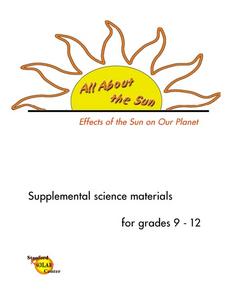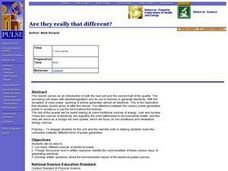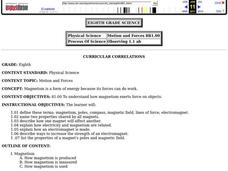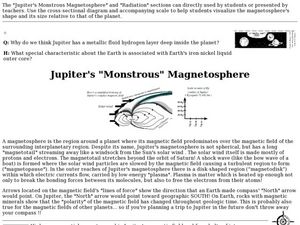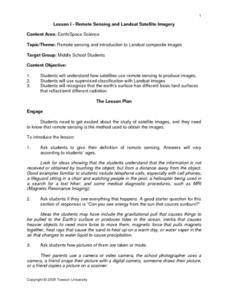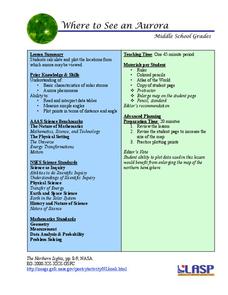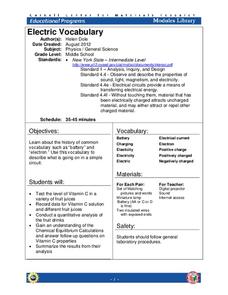Curated OER
Physics- global warming
Students discuss the concept of global warming and view a multimedia clip on the global warming phenomenon. They statistically analyze mean temperature data and compare a given set of data. Data on atmospheric CO2 is done then they...
Curated OER
Effects of the Sun on Our Planet (Grades 9-12)
Students examine the Earth's magnetosphere and observe the effects of the sun's energy on it. They discover the difference between true north and magnetic north. They also explore how solar cells convert solar energy to electricity.
Curated OER
Science: Generating Electricity
Eighth graders examine the various methods of generating electricity and explain their commonalities. They determine what is the most common source of energy and what are the potential environmental health hazards due to electrical...
Curated OER
Motion and Forces
Eighth graders define the terms: magnetism, poles, compass, magnetic field, lines of force, electromagnet. They name two properties shared by all magnets and describe how one magnet will affect another.
Curated OER
MagLev Train System Activity
High schoolers are able to analyze practices that affect the use, availabiltiy, and management of natural resources. They are able to show that the forces of friction retards motion. Students investigate electricity and magnetism as...
Curated OER
Electric Circuits
Students explore energy by completing an electricity worksheet. In this conductors instructional activity, students define the energy related vocabulary terms circuit, electronics, conductor and semi-conductor before examining computer...
Curated OER
Light the Bulb
Learners explore electricity. In this power experiment lesson, students determine what is required for lighting a bulb. Learners develop an understanding of open and closed circuits, and how energy is formed
Curated OER
Sunspots
Students examine what a sunspot is and how it is produced. In this sun lesson plan students locate and measure sunspots then view them through a camera.
Curated OER
Seeing The Sun In A New Light
Students examine the observation of "coronal holes," by x-rays, also about related fast streams and moderate magnetic storms that recur at 27 day intervals. They study NASA'S great observatories.
Curated OER
Jupiter's "Monstrous" Magnetosphere
Students explore Jupiter's magnetosphere. In this Jupiter lesson, students examine a diagram of the magnetic field that surrounds Jupiter.
Curated OER
Aurora Borealis
Students discuss what causes the northern lights and the folklore attached to them. They discuss magnetic fields, and use various common materials to discover if ions conduct electricity.
Curated OER
Observing Bursts from an X-ray Burster
Students study the use of X-ray data to make size and energy estimates of the source and the processes occurring there. They use XTE observations of the object GRO 1744-28 to determine whether bursts occur periodically and the duration...
Curated OER
Spectroscopy Demonstrations
Students study light and see what emits photons and that light can be separated onto a spectrum. In this energy and matter instructional activity students identify gases using a spectrum chart.
Curated OER
Webbing out Electricity
Fourth graders identify electricity as a form of energy that is associated with common household products. They utilize technology as an aid in which they can graphically organize their thoughts.
Curated OER
Electricity Safety Video
Students discuss Picture 1 - Electrical Applicances. They discuss their prior knowledge of electricity and then listen to a video. They then answer the questions on the worksheet called, "Lesson 1 Electricity Safety Video" and share...
Curated OER
Remote Sensing and Landsat Satellite Imagery
Learners comprehend how satellites use remote sensing to produce images. They use supervised classification with Landsat images. Students recognize that the earth's surface has different basic land surfaces that reflect/emit different...
PHET
CME Plotting
Young scientists build on their previous knowledge and apply it to coronal mass ejections. By plotting the path of two different coronal mass ejections, they develop an understanding of why most don't collide with Earth.
Virginia Department of Education
Isotopes
Lead your class through the amazing world of isotopes as they investigate the various properties they contain and further understand their respective location on the periodic table. They explore half-lives and radioactivity as each...
Cornell University
Glued into Science—Classifying Polymers
Explore the unique characteristics of polymers. A complete instructional activity begins with a presentation introducing polymers. Following the presentation, young scientists develop a laboratory plan for creating substances using...
PHET
Where to See an Aurora
Where can you see an aurora in North America? After completing an astronomy activity, scholars can locate the exact coordinates. Pupils plot points of the inner and outer ring of the auroral oval and answer questions based on their...
Virginia Department of Education
Atomic Structure: Elements
It's all relevant, really. Individuals use the scientific method to learn more about elements, atoms, and their placement on the periodic table. They conduct experiments using materials common in nature to explore how elements affect our...
University of Texas
Matter and the Periodic Table Chemical Families and Periodic Trends
Is assembling the periodic table as simple as Tetris? Scholars arrange colored cards into a logical order and then make connections to the arrangement of the periodic table. Hands-on activities include adding trend arrows and analyzing...
Cornell University
Electric Vocabulary
Practice electric vocabulary using multiple methods. Learners begin by watching a video that explains vocabulary related to electric currents. They match vocabulary cards to practice and then create an electric circuit. Using the...
Space Awareness
Meet Our Neighbors: Sun
The sun isn't just a ball of yellow! Young scientists learn about the features of the sun using a hands-on modeling activity. They build models of the sun using common household items to represent sunspots, solar prominence, and the...



